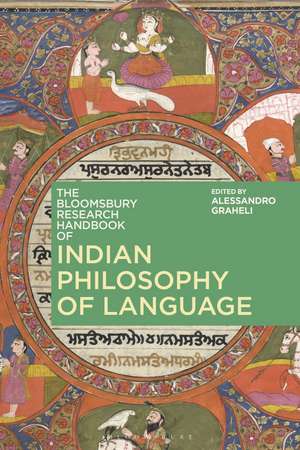The Bloomsbury Research Handbook of Indian Philosophy of Language: Bloomsbury Research Handbooks in Asian Philosophy
Editat de Alessandro Grahelien Limba Engleză Paperback – 27 iul 2022
| Toate formatele și edițiile | Preț | Express |
|---|---|---|
| Paperback (1) | 216.98 lei 6-8 săpt. | |
| Bloomsbury Publishing – 27 iul 2022 | 216.98 lei 6-8 săpt. | |
| Hardback (1) | 775.98 lei 6-8 săpt. | |
| Bloomsbury Publishing – 18 mar 2020 | 775.98 lei 6-8 săpt. |
Preț: 216.98 lei
Nou
Puncte Express: 325
Preț estimativ în valută:
41.52€ • 43.35$ • 34.36£
41.52€ • 43.35$ • 34.36£
Carte tipărită la comandă
Livrare economică 04-18 aprilie
Preluare comenzi: 021 569.72.76
Specificații
ISBN-13: 9781350355798
ISBN-10: 1350355798
Pagini: 488
Dimensiuni: 156 x 234 mm
Greutate: 0.68 kg
Editura: Bloomsbury Publishing
Colecția Bloomsbury Academic
Seria Bloomsbury Research Handbooks in Asian Philosophy
Locul publicării:London, United Kingdom
ISBN-10: 1350355798
Pagini: 488
Dimensiuni: 156 x 234 mm
Greutate: 0.68 kg
Editura: Bloomsbury Publishing
Colecția Bloomsbury Academic
Seria Bloomsbury Research Handbooks in Asian Philosophy
Locul publicării:London, United Kingdom
Caracteristici
Covers the key themes in the philosophy of language together with the major Indian philosophy traditions
Notă biografică
Alessandro Graheli is principal investigator of the FWF project "The Meaning of the Sentence in Indian Philosophy" at the Institute for the Cultural and Intellectual History of Asia, Austrian Academy of Science, Austria, and Assistant at the Department of South Asian, Tibetan, and Buddhist Studies, University of Vienna, Austria.
Cuprins
Introduction Part I. Of Speech Units: Phonemes, Words, and Sentences Introduction1. Linguistic Segmentation in Early Vyakarana, Maria Piera Candotti2. From Permanent Phonemes to Words, Monika Nowakowska3. Ontology and Epistemology of Speech in Nyaya, Alessandro Graheli4. The theory of the Sphota, Akane Saito5. A Buddhist Refutation of Sphota, Sara McClintock6. The Place of Language in the Philosophy of the Recognition, Marco Ferrante Part II. Of Word Meanings Introduction 7. Early Nyaya on the Meaning of Common Nouns, Matthew R. Dasti8. Dignaga on Relation, Kei Kataoka9. Meanings of Words and Sentences in Mimamsa, Elisa Freschi10. Sabdartha as Sense or Reference: Dharmakirti on Synonymy, Patrick McAllister11. Semantic Relations and Causation of Verbal Knowledge, Alessandro Graheli12. Human Intellect and God's Will in Navya Nyaya Semantics, Yoichi Iwasaki Part III. Of Sentence MeaningsIntroduction 13. Salikanatha's Introduction to his Fundamentals of Sentence Meaning, Andrew Ollett14. Salikanatha on Language Acquisition, Kei Kataoka15. The Deontic Nature of Language in Mimamsa and Vedanta Schools, Elisa Freschi16. Speaking of the individual: Prakasatman's akhandarthavada and the beginnings of a theory of language in classical Advaita-Vedanta, Hugo David17. The Role of Intention in Gangesa's Non-Communicational Model of Verbal Understanding, Yoichi Iwasaki Part IV. Of ImplicaturesIntroduction 18. Kumarila on the Role of Implicature in Sentence-Signification, Lawrence McCrea19. The Intentionality of Words: Jayanta's Syncretism of Nyaya and Mimamsa, Alessandro Graheli20. Rasa as Sentence Meaning, Andrew Ollett21. Meaning beyond Words: The Implicature Wars, Daniele Cuneo Chronology Glossary Annotated Bibliography of Indian Philosophy of LanguageIndex
Recenzii
[A] useful work for those wishing to find out more about the subject . It brings together some of the best research currently available on the key topics of classical Indian philosophy of language.
The essays in this collection offer learned yet clear introductions to the major themes and controversies of Indian philosophy of language. Engagingly written, accurate and well documented, the volume represents a substantial contribution to the field of Indian Studies.
The essays in this collection offer learned yet clear introductions to the major themes and controversies of Indian philosophy of language. Engagingly written, accurate and well documented, the volume represents a substantial contribution to the field of Indian Studies.










